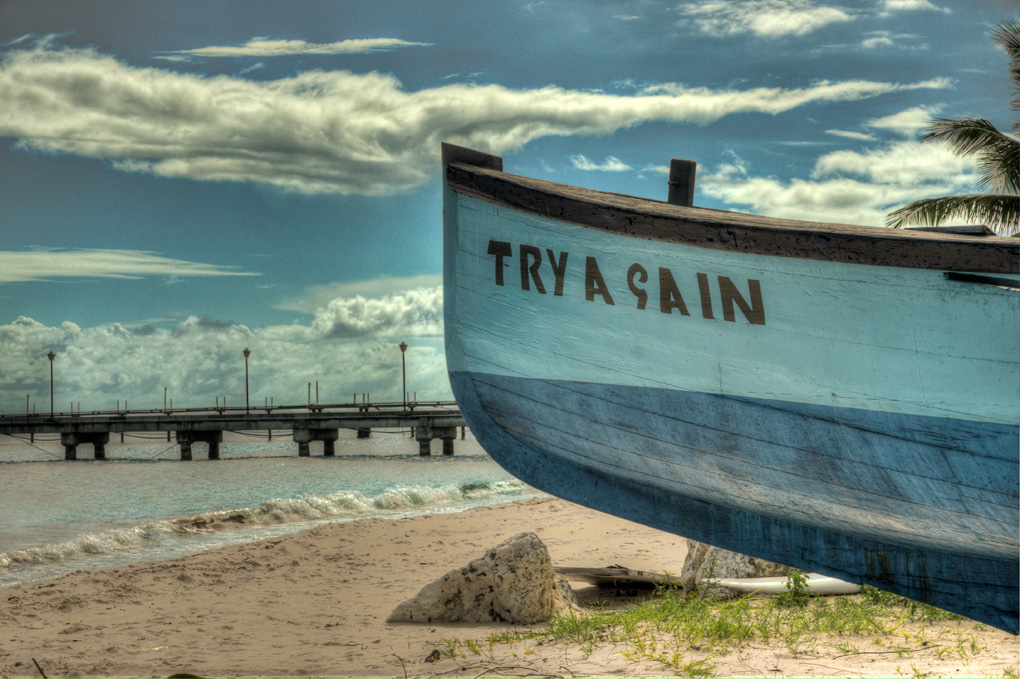
To spend reading break on a beach in the Caribbean sounds like idyllic holiday most students crave. A chance to do field work in Barbados at McGill’s Bellairs Research Institute may fit this holiday description for some students. However, what they do not know is that you cannot see the bottom of the ocean on some of the shorelines there. Postcard beaches, gently caressed by crystal clear waves are on occasion opaque, turned murky green-brown. The colour of of untreated wastewater. We stood silent, hearts heavy, by the ocean as raw sewage poured off of the island and into the water before our ingenuous eyes.
It is one thing to be aware, and yet an entire other feeling to be a witness. While the real and demanding consequences of anthropogenic climate change are consistently at the forefront of most student’s thoughts in the School of Environment, I heard a small crack in my minuscule foundation of optimism that day. It is one thing to know some agencies don’t have adequate supplies; another entirely to listen to a chemist working at a treatment plant tell you he only tests for E. Coli once a month due to lack of supplies. For reference, we run those tests several times a day in Peterborough and we are by no means a leader in water treatment management. To spend one day snorkeling among colourful fish, and reefs that just MAYBE seem to be recuperating, and then to watch watch sewage get washed in, a little more with each wave, little additions to a big problem.
When asked about my major – a popular topic in a society that values a degree more than your own fucking personhood – I often describe it as the most depressing degree you can take. In the future our parents built, we have to actively work against degrading the environment. Students in our discipline are acutely aware of unsustainable habits. Ever cried outside a bar because of how much single-use plastic you saw in action? No, me neither.
Hopeless would be the bland square box I check off to describe this complex and dynamic emotion plaguing me. Hopeless is feeling like you have to run to your own death. Hopeless is how I feel when the hard facts about the consequences of our actions are presented to the jury and SOMEHOW the price of our planet is goddamn bargain to them.
Re-organizing the priorities of this small island state would take a team of scientists and a strong co-management approach focusing on sustainable development. We know what all of words mean. By gosh, we could fix this! Many of us in our glory year of university, this breakthrough was a Hail Mary game changer; we could save the planet one management plan at a time.
This conversation took place at a fish market. It was the final night for many of us in Barbados. We had free time to do what students do (binge drinking, in case you couldn’t read between the lines there). A couple beers in, the fish market is already a grim place for vegetarians such as myself. However, many others are relishing the experience to eat freshly caught fish that they have never tasted before. As we circle around the back of the market (a golden ticket moment of being a researcher), our professor leads us out to the docks passing the back rooms where the fish are processed. As environmental science students we have all seen Sharkwater and we know what shark fins look like but fuck, no one wants to believe it when they see it. We hadn’t even finished our sentiments of hope and a brighter future before the grim reality of it all bitch slapped us.
Sub-adult tiger shark fins.
I know my professor was adamant that it was swordfish and we should all chill out (okay, maybe that’s paraphrasing) but Madison Stewart, also known by her Instagram handle @sharkgirlmadison confirmed that it was, in fact, not swordfish. I had to know where these fins came from, so I reached out to Stewart for a second opinion. Stewart, who worked on Sharkwater 2: Extinction, said “Straight away… that’s a young tiger shark”.
On our way home, another student sent me a Youtube video they had found. Was this common in the Barbados? We wanted to know. After all, we’re trained to think critically, aren’t we? He had found a video of shark fishing taken in Barbados. Not a tourist boat, which is a common sport in areas like Florida, but of local fishermen taking sharks out of the water and finning them. Madison says that when sharks are by catch (and scooped as unintended catch), they are often sold under a general fish name. I think back to the freshly caught fish, fried up and eaten by my colleagues, and wonder who in this game of Russian roulette ate tiger shark that night.
For a fleeting moment, students of the most depressing degree in the world thought they had it figured out. We celebrated the impacts we could have after the university bubble. It was just as quickly we realized we hadn’t left the bubble. I don’t know why my professor avoided our line of questioning, and I don’t know how we didn’t see this before after spending a week researching the island’s environmental management. What do we know? That we can’t see the bottom of the ocean anymore, and I can’t see the way off of this path we’re on.
